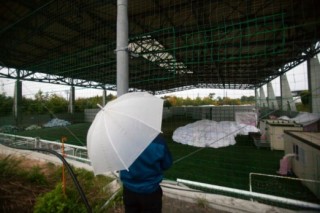Loading
Search
▼ Japan's Olympic Soccer Teams To Train in Nuclear Clean-up Zone
- Category:Other
TOKYO — Japan’s Olympic soccer teams will train for the Tokyo 2020 Games at a complex currently being used as a base for thousands of workers cleaning up the crippled Fukushima nuclear plant.
The Japan Football Association (JFA) said Monday that the Japanese men’s and women’s teams would hold their training camps at J-Village, once the country’s center of excellence until it was taken over by plant operators following the 2011 nuclear disaster.
“The teams will use the J-Village facility as a training base,” JFA communications chief Takato Maruyama told AFP.
“It is something the JFA had been talking about but a timeline hadn’t been formally approved by the executive board, until now,” Maruyama said.
J-Village is on the fringes of the old 20-kilometer exclusion zone around the stricken plant, which suffered a triple reactor meltdown after a giant tsunami slammed into it in March, 2011, causing massive radiation leaks and forcing the evacuation of more than 150,000 people.
As the nuclear crisis raged, J-Village became the front line in the fight to control the situation, with helipads, medical center and dormitories hastily erected for workers filing in and out of the plant in their protective suits and masks. Following the removal of the no-entry zone last September, the sprawling site located in the sleepy town of Naraha will undergo large-scale reconstruction with a view to a partial reopening by July 2018.
“Obviously the complex will need some refurbishment but that is the time frame we have heard from TEPCO (Tokyo Electric Power Company) and J-Village,” said Maruyama.
Japanese officials plan to reopen the facility—originally constructed by TEPCO and donated to the regional government in 1997—to serve as a symbol of recovery for the Tokyo Olympics. Venues in the tsunami-ravaged northeastern Tohoku region also hoping to be involved in the Games.
“J-Village has always been an important venue and it has a large role to play in the recovering of Fukushima,” JFA director Eiji Ueda told local media.
Despite the symbolic value of training at the complex, the JFA insisted that safety was of utmost importance.
“We can’t make any specific comment on radiation but clearly you can’t play football in places where it isn’t safe for people to go,” said Maruyama, referring to the proposal to reopen J-Village in 2018.
“Obviously it will be opened on condition that all decontamination work has been completed safely,” he added.
“We can’t say (at this point) if that decontamination will have been fully carried out and whether there will be zero effect from radiation by that time.”
© 2016 AFP
The Japan Football Association (JFA) said Monday that the Japanese men’s and women’s teams would hold their training camps at J-Village, once the country’s center of excellence until it was taken over by plant operators following the 2011 nuclear disaster.
“The teams will use the J-Village facility as a training base,” JFA communications chief Takato Maruyama told AFP.
“It is something the JFA had been talking about but a timeline hadn’t been formally approved by the executive board, until now,” Maruyama said.
J-Village is on the fringes of the old 20-kilometer exclusion zone around the stricken plant, which suffered a triple reactor meltdown after a giant tsunami slammed into it in March, 2011, causing massive radiation leaks and forcing the evacuation of more than 150,000 people.
As the nuclear crisis raged, J-Village became the front line in the fight to control the situation, with helipads, medical center and dormitories hastily erected for workers filing in and out of the plant in their protective suits and masks. Following the removal of the no-entry zone last September, the sprawling site located in the sleepy town of Naraha will undergo large-scale reconstruction with a view to a partial reopening by July 2018.
“Obviously the complex will need some refurbishment but that is the time frame we have heard from TEPCO (Tokyo Electric Power Company) and J-Village,” said Maruyama.
Japanese officials plan to reopen the facility—originally constructed by TEPCO and donated to the regional government in 1997—to serve as a symbol of recovery for the Tokyo Olympics. Venues in the tsunami-ravaged northeastern Tohoku region also hoping to be involved in the Games.
“J-Village has always been an important venue and it has a large role to play in the recovering of Fukushima,” JFA director Eiji Ueda told local media.
Despite the symbolic value of training at the complex, the JFA insisted that safety was of utmost importance.
“We can’t make any specific comment on radiation but clearly you can’t play football in places where it isn’t safe for people to go,” said Maruyama, referring to the proposal to reopen J-Village in 2018.
“Obviously it will be opened on condition that all decontamination work has been completed safely,” he added.
“We can’t say (at this point) if that decontamination will have been fully carried out and whether there will be zero effect from radiation by that time.”
© 2016 AFP
- February 25, 2016
- Comment (0)
- Trackback(0)


